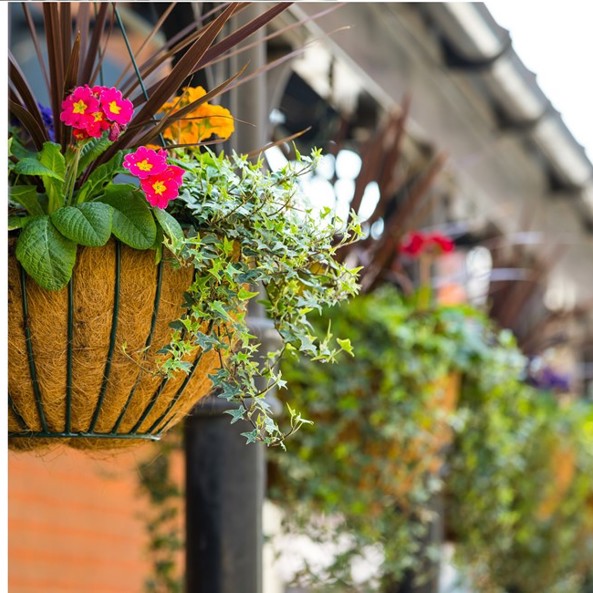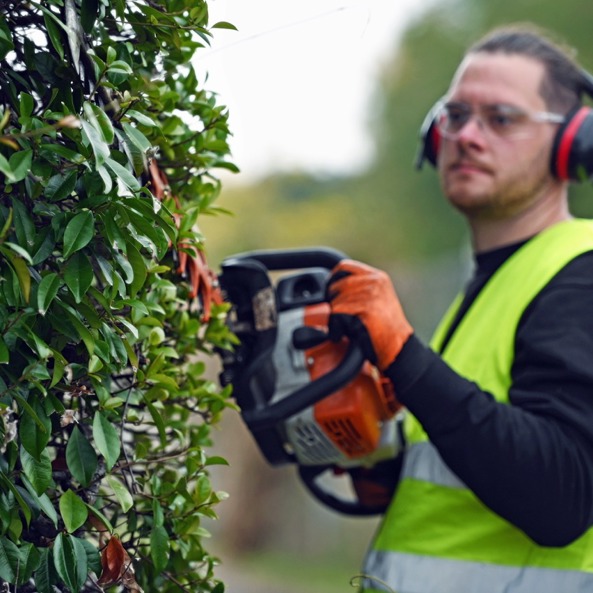With summer approaching, now is the ideal time to prepare your garden for the warmer months ahead. Whether you're maintaining a home garden, managing a pub garden, or looking after a commercial outdoor space, proper preparation can make the difference between a thriving summer display and a wilting disappointment. Are you concerned about how your garden will cope with potential heat waves? Wondering when to start preparing hanging baskets? Worried about water conservation during dry spells? This guide provides practical steps to ensure your garden—whatever its size or purpose—thrives throughout the summer season.
Step 1: Spring Assessment and Wishlisting
Begin your summer preparation with a thorough assessment of your garden's current state and what you want to grow fo summer. Start by walking through your garden and noting:
● Areas of poor drainage or soil quality
● Damaged or aging garden structures
● Plants that struggled last summer
● Spaces that need redesigning or replanting
According to the Royal Horticultural Society, gardens that undergo a spring assessment are 40% more likely to thrive during challenging summer conditions. This initial audit allows you to prioritise your preparation efforts.

Develop a schedule working backwards from peak summer, considering early spring for soil preparation and structural repairs, mid-spring for planting and irrigation installation, and late spring for final touches like mulching and container preparation.
For pub gardens and commercial spaces, consider phasing work to minimise disruption to customers. Planning ahead also helps with budgeting and resource allocation, particularly important for commercial settings where summer represents peak trading periods.
Step 2: Soil Preparation and Improvement
Healthy soil is the foundation of a successful summer garden, supporting plants through heat and potential drought. Check soil pH and nutrient levels (ideal pH for most garden plants is 6.0-7.0), address compaction in high-traffic areas (particularly relevant for pub gardens), add organic matter to improve moisture retention and soil structure, and apply slow-release fertilisers appropriate to your planting scheme.
In commercial settings like pub gardens, focus on high-impact areas first. Recent studies by the Soil Association show that improving soil organic matter by just 2% can increase water retention capacity by up to 30%, significantly reducing irrigation needs during summer dry spells.
Mulching is perhaps the most cost-effective summer preparation step:
● Apply a 5-7cm layer of organic mulch around plants and trees
● Keep mulch slightly away from stems and trunks to prevent rot
● Consider decorative gravel for high-visibility areas in pub gardens
● Use mulch mats for hanging baskets and containers
Professional landscapers report that proper mulching can reduce watering requirements by up to 60% while simultaneously suppressing summer weed growth. For pub gardens with extensive planting, this represents significant time and cost savings during the busy summer season. Quality grounds maintenance routines should always include proper mulching as part of seasonal preparation.
Step 3: Planting and Container Preparation
Thoughtful plant selection and proper container preparation are essential for summer success. For summer-proof planting schemes consider Mediterranean plants with silver foliage (lavender, santolina, artemisia), native wildflowers adapted to local conditions, ornamental grasses that add movement and drought tolerance, and deep-rooted perennials that access lower water tables.
For pub garden hanging baskets, research from the University of Reading suggests that mixing drought-tolerant trailing plants like petunias, verbena, and calibrachoa with water-retaining foliage plants increases display longevity by up to 40% compared to traditional bedding-only displays.
Hanging baskets are signature features of British pub gardens and require special preparation:
● Line baskets with water-retentive materials (coir or special liners)
● Use quality compost mixed with water-retaining gel crystals
● Install central watering reservoirs for easier maintenance
● Choose basket locations considering exposure to prevailing winds
● Group containers to create microclimate protection
According to commercial growers, pub hanging baskets prepared with water-retentive liners and gels require 35% less frequent watering than standard baskets, a critical advantage during busy summer periods. Pre-planting baskets 3-4 weeks before positioning allows root systems to establish, significantly improving drought resistance.
Living walls offer space-efficient solutions for smaller gardens and create distinctive features in pub settings. Service existing systems, checking for winter damage, clean and test irrigation components, replace any failed plants before summer growth, and add slow-release fertiliser appropriate for vertical systems.
Recent installations at several award-winning pub gardens demonstrate that modular outdoor living wall systems planted with drought-tolerant sedums, heucheras, and small grasses require 70% less maintenance than traditional bedding displays while creating greater visual impact.
Step 4: Irrigation and Water Management
Efficient water management is increasingly important with changing climate patterns and potential water restrictions. Service existing irrigation systems, checking for leaks or blockages, consider upgrading to drip irrigation which reduces water usage by up to 70%, install moisture sensors to prevent overwatering, and zone irrigation systems to match plant needs and sun exposure.
For pub gardens, the latest smart irrigation controllers that adjust watering based on weather forecasts show return on investment within one season through water savings and reduced plant losses, according to data from commercial landscape contractors.
Implement water conservation techniques by:
● Installing water butts and rain collection systems (modern slimline designs suit smaller spaces)
● Creating watering basins around trees and larger shrubs
● Applying water directly to soil rather than foliage to reduce evaporation
● Watering deeply but infrequently to encourage deeper root growth
Water companies report that gardens with established conservation methods use up to 65% less mains water during summer months, according to Water UK. For commercial gardens, this represents significant cost savings while supporting environmental commitments.
Prepare for potential hosepipe bans and water restrictions by identifying priority plants that will need maintaining, sourcing alternative water supplies (grey water systems), having temporary shade structures ready for deployment, and preparing for hand-watering of essential displays if needed.
Analysis of the drought periods in 2022-2024 showed that pub gardens with established drought plans maintained 85% better visual appearance through restrictions than those without preparation, directly impacting customer satisfaction and revenues. Consider including outdoor plant displays that feature drought-tolerant species as part of your summer garden strategy.
Step 5: Garden Structure and Furniture Preparation
Garden structures and furniture need preparation to withstand summer use and weather conditions:
● Check for winter damage to pergolas, trellises, and fencing
● Apply preservative treatments before peak summer weather
● Clean and treat wooden furniture with appropriate protectants
● Consider more durable composite materials for high-traffic areas
Commercial outdoor furniture manufacturers recommend specific UV-resistant treatments that extend furniture life by up to 40% when applied before peak summer exposure, according to industry trade reports. For pub gardens, where furniture represents significant investment, this preventative maintenance is particularly valuable.

Create effective shade solutions by checking and servicing existing parasols and awnings, considering installing permanent shade sails for reliable protection, planting strategically for natural shade development, and ensuring pub garden shade covers at least 40% of seating areas.
Heat mapping of successful pub gardens reveals that spaces with properly designed shade provision see 35% higher dwell times during hot weather and significantly increased food and beverage sales compared to exposed seating areas. Looking for specific ideas to enhance your pub's outdoor space? Check out these innovative pub garden ideas for inspiration.
Step 6: Pest and Disease Prevention
Proactive pest management prevents problems before they impact summer enjoyment. Apply nematode treatments for slug control in late spring, install physical barriers against common pests (cabbage collars, fruit netting), position bird and bat boxes to encourage natural pest predators, and use companion planting strategies to deter pests naturally.
The Organic Growers Association reports that gardens implementing integrated pest management see 45% fewer serious pest outbreaks during summer months. For pub gardens, where aesthetic appearance directly impacts business, this prevention is particularly valuable. If you're struggling with specific insect issues, consider these tips on how to keep gnats and fruit flies away from your garden.
Monitor and maintain plant health with these key actions:
● Remove spring weeds before they seed
● Prune spring-flowering shrubs to encourage sturdy growth
● Apply preventative fungicide to plants prone to powdery mildew
● Establish regular inspection routines for early problem detection
Commercial landscapers estimate that early intervention reduces treatment costs by 60-70% compared to addressing established problems, while maintaining better visual appearance throughout the season. For properties with invasive plant issues, consider professional invasive plant removal services as part of your preparation work.
Step 7: Final Preparations and Ongoing Maintenance
Complete these final steps as summer approaches and establish maintenance routines for the season ahead:
● Deep water all plants before expected hot periods
● Apply final mulch top-ups to exposed soil
● Position containers and hanging baskets in their final locations
● Calibrate irrigation systems for summer conditions
Garden maintenance contractors report that this final intensive preparation reduces summer maintenance requirements by up to 30%, freeing time for enjoying rather than working in the garden, according to a recent Horticulture Week industry survey.
Establish efficient maintenance schedules by creating calendar reminders for key maintenance tasks, prioritising early morning and evening maintenance to avoid heat stress, implementing "little and often" approaches for deadheading and tidying, and setting up monitoring systems for irrigation performance.
For pub gardens, landscaping firms recommend dedicated morning maintenance sessions (30-45 minutes before opening) for deadheading, litter removal, and quick irrigation checks, maintaining pristine appearances with minimal customer disruption. Understanding what comprehensive grounds maintenance involves can help you create more efficient maintenance routines.
For Expert Advice
Thorough preparation is the key to a thriving summer garden, whether at home or in a commercial setting like a pub. By following these structured steps—assessing, preparing soil, selecting appropriate plants, managing water efficiently, maintaining structures, preventing pests, and establishing good routines—you'll create an outdoor space that not only survives but thrives throughout the summer months.
For professional assistance with your garden preparations, including hanging baskets, living walls, or comprehensive grounds maintenance, contact PHS Greenleaf for expert advice and services tailored to your specific garden needs.

























